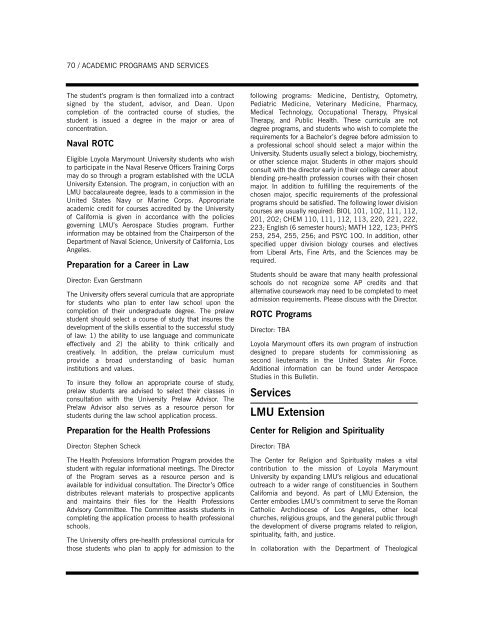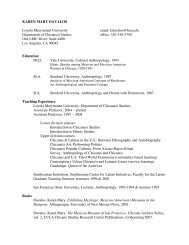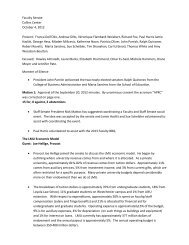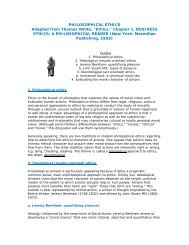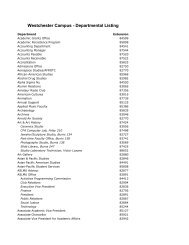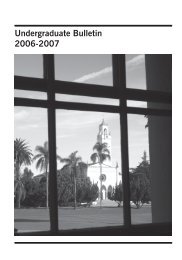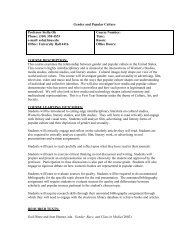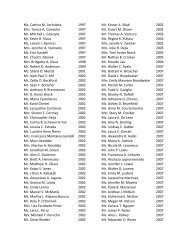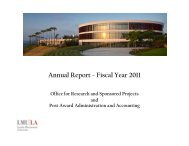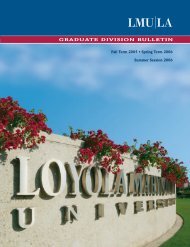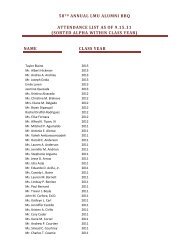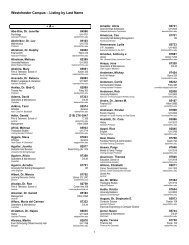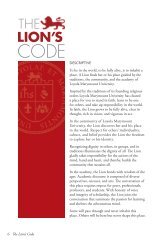Undergraduate Bulletin - Loyola Marymount University
Undergraduate Bulletin - Loyola Marymount University
Undergraduate Bulletin - Loyola Marymount University
You also want an ePaper? Increase the reach of your titles
YUMPU automatically turns print PDFs into web optimized ePapers that Google loves.
70 / ACADEMIC PROGRAMS AND SERVICES<br />
The student’s program is then formalized into a contract<br />
signed by the student, advisor, and Dean. Upon<br />
completion of the contracted course of studies, the<br />
student is issued a degree in the major or area of<br />
concentration.<br />
Naval ROTC<br />
Eligible <strong>Loyola</strong> <strong>Marymount</strong> <strong>University</strong> students who wish<br />
to participate in the Naval Reserve Officers Training Corps<br />
may do so through a program established with the UCLA<br />
<strong>University</strong> Extension. The program, in conjuction with an<br />
LMU baccalaureate degree, leads to a commission in the<br />
United States Navy or Marine Corps. Appropriate<br />
academic credit for courses accredited by the <strong>University</strong><br />
of California is given in accordance with the policies<br />
governing LMU’s Aerospace Studies program. Further<br />
information may be obtained from the Chairperson of the<br />
Department of Naval Science, <strong>University</strong> of California, Los<br />
Angeles.<br />
Preparation for a Career in Law<br />
Director: Evan Gerstmann<br />
The <strong>University</strong> offers several curricula that are appropriate<br />
for students who plan to enter law school upon the<br />
completion of their undergraduate degree. The prelaw<br />
student should select a course of study that insures the<br />
development of the skills essential to the successful study<br />
of law: 1) the ability to use language and communicate<br />
effectively and 2) the ability to think critically and<br />
creatively. In addition, the prelaw curriculum must<br />
provide a broad understanding of basic human<br />
institutions and values.<br />
To insure they follow an appropriate course of study,<br />
prelaw students are advised to select their classes in<br />
consultation with the <strong>University</strong> Prelaw Advisor. The<br />
Prelaw Advisor also serves as a resource person for<br />
students during the law school application process.<br />
Preparation for the Health Professions<br />
Director: Stephen Scheck<br />
The Health Professions Information Program provides the<br />
student with regular informational meetings. The Director<br />
of the Program serves as a resource person and is<br />
available for individual consultation. The Director’s Office<br />
distributes relevant materials to prospective applicants<br />
and maintains their files for the Health Professions<br />
Advisory Committee. The Committee assists students in<br />
completing the application process to health professional<br />
schools.<br />
The <strong>University</strong> offers pre-health professional curricula for<br />
those students who plan to apply for admission to the<br />
following programs: Medicine, Dentistry, Optometry,<br />
Pediatric Medicine, Veterinary Medicine, Pharmacy,<br />
Medical Technology, Occupational Therapy, Physical<br />
Therapy, and Public Health. These curricula are not<br />
degree programs, and students who wish to complete the<br />
requirements for a Bachelor’s degree before admission to<br />
a professional school should select a major within the<br />
<strong>University</strong>. Students usually select a biology, biochemistry,<br />
or other science major. Students in other majors should<br />
consult with the director early in their college career about<br />
blending pre-health profession courses with their chosen<br />
major. In addition to fulfilling the requirements of the<br />
chosen major, specific requirements of the professional<br />
programs should be satisfied. The following lower division<br />
courses are usually required: BIOL 101, 102, 111, 112,<br />
201, 202; CHEM 110, 111, 112, 113, 220, 221, 222,<br />
223; English (6 semester hours); MATH 122, 123; PHYS<br />
253, 254, 255, 256; and PSYC 100. In addition, other<br />
specified upper division biology courses and electives<br />
from Liberal Arts, Fine Arts, and the Sciences may be<br />
required.<br />
Students should be aware that many health professional<br />
schools do not recognize some AP credits and that<br />
alternative coursework may need to be completed to meet<br />
admission requirements. Please discuss with the Director.<br />
ROTC Programs<br />
Director: TBA<br />
<strong>Loyola</strong> <strong>Marymount</strong> offers its own program of instruction<br />
designed to prepare students for commissioning as<br />
second lieutenants in the United States Air Force.<br />
Additional information can be found under Aerospace<br />
Studies in this <strong>Bulletin</strong>.<br />
Services<br />
LMU Extension<br />
Center for Religion and Spirituality<br />
Director: TBA<br />
The Center for Religion and Spirituality makes a vital<br />
contribution to the mission of <strong>Loyola</strong> <strong>Marymount</strong><br />
<strong>University</strong> by expanding LMU’s religious and educational<br />
outreach to a wider range of constituencies in Southern<br />
California and beyond. As part of LMU Extension, the<br />
Center embodies LMU’s commitment to serve the Roman<br />
Catholic Archdiocese of Los Angeles, other local<br />
churches, religious groups, and the general public through<br />
the development of diverse programs related to religion,<br />
spirituality, faith, and justice.<br />
In collaboration with the Department of Theological


